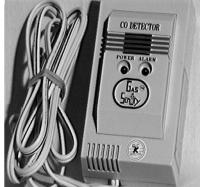Recall: Home Gas Sentry Carbon Monoxide Detectors Hazard
| FOR IMMEDIATE RELEASE | CONTACT: Ken Giles |
| August 6, 1996 | (301) 504-7052 |
| Release # 96-181 | |
CPSC Warns of Failures With Home Gas Sentry Carbon Monoxide Detectors distributed by Stanley Solar & Stove
WASHINGTON, D.C.- The U.S. Consumer Product Safety Commission (CPSC) is urgently warning consumers about 6,000 Home Gas Sentry carbon monoxide (CO) detectors imported and distributed by Stanley Solar & Stove Inc. of Manchester, N.H. that may fail to alarm. As a result, consumers could be exposed to dangerous levels of carbon monoxide, a colorless, odorless, toxic gas, which could lead to serious illness or death.CPSC tested the detectors and found that the detectors could fail to alarm at concentrations of CO at 100 and 200 parts per million. Concentrations at this level can cause serious illness or death.
CPSC requested that Stanley Solar & Stove recall the detectors, remove them from store shelves, and contact retailers and consumers about this recall. CPSC is unilaterally issuing this press release concerning the Home Gas Sentry CO detectors because Stanley Solar & Stove is unable to participate in a recall and has not warned the public about potential risks associated with the CO detectors.
The rectangular, off-white, plastic detectors measure approximately 4.75 inches long, 2.5 inches wide, and 1.75 inches deep with the words "Gas Sentry" on the front of the detector. A green "Power" light and a red "Alarm" light appear in the center of the detectors. The company name, manufacturing date, and manufacturing number are located on a sticker on the back of the detector. The detectors have a white cord and plug.
Coal and wood stove dealers sold the detectors in the northeastern United States from February 1988 to May 1996 for approximately $80. The detectors were packaged in a rectangular white box labeled in part, "Home Gas Sentry...120 Volts AC...Model Z-1604-KM...

Consumers are urged to stop using the Home Gas Sentry CO detectors and replace them with new detectors that meet Underwriters Laboratories Standard 2034 effective October 1, 1995.
CO is produced when fuel is burned with incomplete combustion. CO poisoning from home fuel-burning appliances and camping equipment kills at least 250 people each year and sends another 5,000 to hospital emergency rooms for treatment. Symptoms of carbon monoxide poisoning are similar to the flu (without the fever). They include dizziness, fatigue, headache, nausea, and irregular breathing. Common sources of carbon monoxide include room heaters, furnaces, charcoal grills, ranges, water heaters, and fireplaces.